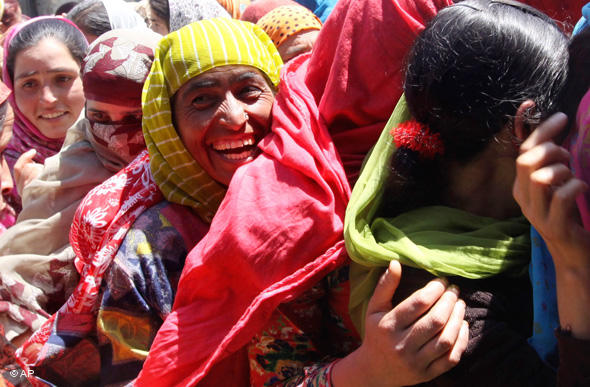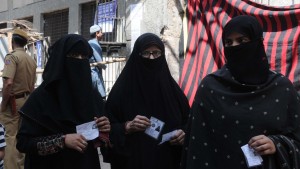Nearly all India’s Muslim women reject ‘triple talaq’ and polygamy (II)

Kashmiri Muslim women laugh as they push each other playfully outside a polling station in Wattergam, some 75 Kilometers (47 miles) from Srinagar, India. @ AP Photo/Dar Yasin
Zakia Soman is a founder member of Bharatiya Muslim Mahila Andolan (BMMA), a mass organization of muslim women in India. According to a survey conducted by her organization, more than 90 percent of Muslim women surveyed in India want the “triple talaq” divorce ritual and polygamy banned from family civil law in the country.
Zakia Soman heads the Peace and Human Security theme in Action Aid. She is a member of SAAPE, South Asian Alliance for Poverty Eradication which engages with the issues of excluded communities regionally. She works and writes on issues of peace and justice, secularism, human rights, minority rights and rights of muslim women.
Ashutosh Pandey from DW asked her, what does the law in India say about triple talaq?
Zakia Soman: In India we do not have codified laws when it comes to Muslim personal law. We have two laws dating to the times of the British. The 1937 Act which says that the Muslims of India will be governed by Sharia but what comprises the Sharia and what are different aspects of Sharia that is not mentioned there. The other is the 1939 Act, which provides nine grounds on the basis of which a Muslim woman can go to the court seeking a divorce. Then there is the 1986 Maintenance act according to which if a Muslim woman is divorced she is entitled to one time lump sum maintenance.
What measures should be taken to limit the abuse of this practice?
All these aspects are governed by the common sense and understanding of the religious people who deal with these matters and they are 100 percent male and there understanding is also very limited and very patriarchal as a result we have incidents of triple talaq and polygamy. So the Quranic injunctions which talk about the rights of women, the spirit of Quran wherein women have rights in marriage and at home. All these provisions have not been popularized.

Muslim women on their way to a polling station in Jama Masjid locality for casting their votes for the parliamentary election -2014 in New Delhi. © UNI
Many Islamic organizations in India such as the All India Muslim personal law board say they are discouraging this practice but are not keen to outlaw it. Is it enough to solve the problem?
Any attempt at reforming the law is blocked mainly by this group. It is blocked by the argument “oh you cannot interfere in our religious matters”. They say that law is divine. We all know that law is man-made there is nothing divine about a law. The text is divine but the law is man-made…
The secular political parties are wary of this tag coming to them that were a party to an action deemed detrimental to the Muslims, which is the largest minority group. How can helping a Muslim woman be interpreted as working against the Muslim community?
What in your opinion is the root cause of this resistance from most Muslim organizations to effectively deal with this practice?
If you just wait for the goodwill of different persons that they would not do it, it is not happening. We run Sharia courts in different 4 locations in India. In 2014 we got 250 odd cases of which majority cases were about triple talaq, unilateral talaq, talaq in the absence of the wife, witnesses and so on.
Is Uniform Civil Code the solution?
BMMA has prepared a draft for Muslim Personal law and this draft is based on Quran. The group is calling on the civil society and the Parliament to have a codified law to govern marriage and family matters. The group has been taking endorsements from other members of the community, including males, to ban triple talaq.
Interview: Ashutosh Pandey
Editor: Marjory Linardy
WTO RECOMMENDS
The campaign against unilateral Talaq
In 1982, the film “Nikah” was released in India. It was a story of a muslim woman whose marriage is dissolved when her husband says “Talaq, Talaq, Talaq.” Talaq literally means divorce. This film focused on the way in which divorce takes place in a Muslim marriage. Today, nearly 30 years later a Muslim women’s advocacy group, the Bharatiya Muslim Mahila Andholan (BMMA) has started campaigning against unilateral and oral Talaq. (From October 23, 2012)
Violence against women in Pakistan often met with ‘state inaction’
Eight years into Pakistan’s democratic transition, violence against women is still endemic, a new ICG report found. The group’s Samina Ahmed talks about why biased attitudes towards women lie at the heart of the problem. (From April 9, 2015)
The Silent Screams…
A UNICEF report claims 70% of girls in Pakistan are married before the age of 16. In comparison, according to UNICEF’s “State of the World’s Children 2009″ report, 47% of India’s women are married before the legal age of 18; and in Bangladesh 63%. In Nepal 68.3% are married before the age of 15. (From January 8, 2015)






